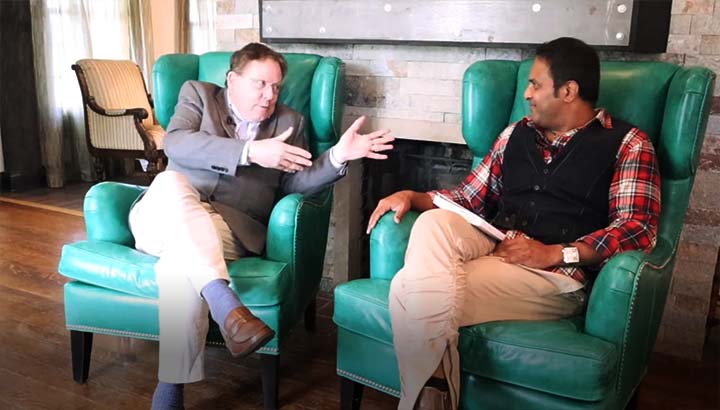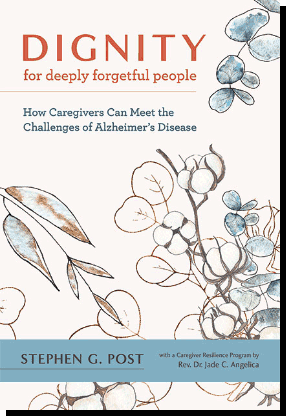Dignity for Deeply Forgetful People: How Caregivers Can Meet the Challenges of Alzheimer’s Disease
In Dignity for Deeply Forgetful People (Johns Hopkins University Press, May 31, 2022), Post offers new perspectives on the worth and dignity of people with Alzheimer’s and related disorders despite the negative influence of “hypercognitive” values that place an ethically unacceptable emphasis on human dignity as based on linear rationality and strength of memory. This bias, Post maintains, is responsible for the abusive exclusion of this population from our shared humanity. With vignettes and narratives, he advocates for a deeper dignity grounded in consciousness, emotional presence, creativity, interdependence, music, and a self that is not “gone.” Post explores the moments of surprising experience of “paradoxical lucidity” that almost all caregivers experience with their loved one, a lucidity that reveals who they still are underneath the losses. He explores the many ways to stimulate and connect with that continuing self.
“I am pleased to see that the noted author Dr. Stephen G. Post is addressing themes such as consciousness and interconnectedness in his new book, which will contribute to the flourishing of humanity.”
—His Holiness the 14th Dalai Lama of Tibet
“In this serious and also uplifting book we can feel Post’s passion for the ‘dignity of deeply forgetful people,’ learn to notice and appreciate their expressions of continuing self-identity, and include them in our moral vision of a shared humanity worthy of equal respect and care. He celebrates caregivers as our highest moral exemplars whose efforts need to be better supported. Drawing from years of case experience, Post offers answers to the big ethical questions that Alzheimer’s presents in a writing style that easily engages families, caregivers, and clinicians. Of even greater significance, Post challenges us all to set aside ‘hypercognitive biases’ and learn from these ‘differently abled’ people as we come to see them anew.”
—Joseph B. Martin, MD, Dean Emeritus, Harvard Medical School
"Stephen Post writes tenderly, lovingly, and wisely about those among us with failing mental faculties. His message reflects the view that we are conscious in spite of what our brain may be doing, and that it is human consciousness that is fundamental to our dignity, even if our cognitive strengths have weakened… In addition, Post thoughtfully probes every imaginable practical ethical question that a caregiver might have based on his three decades of ethics consultation with families. This is a breakthrough book—innovative, humane, inclusive, and uniquely significant—and one book that every caregiver and professional should read.”
—Larry Dossey, MD, Author, One Mind: How Our Individual Mind Is Part of a Greater Consciousness and Why It Matters
“As a son who experienced up close the painful yet precious course of Alzheimer's over two decades, I wish I had had the benefit of Dr Post's book at hand. In this most enlightening study of the mystery of human dignity and identity under siege, he lifts the veil on that dreaded disease and provides insights, explanations, and hope for retaining the connections that count. Those unexpected, seemingly miraculous glimmers of the beloved as 'through a glass darkly' are here illumined, both scientifically and spiritually, as we confront our ultimate humanity—and human potential—face to face.”
—Charles Scribner III, Author of The Shadow of God: A Journey Through Memory, Art, and Faith and Art Historian
“Dr. Stephen G. Post brings a hopeful and human perspective to those who think differently as they are living with cognitive changes, while acknowledging the emotional and psychological impact on the family caregiver. His message and ethical approach to interactions support the ‘enduring self- hood’ of the deeply forgetful, restoring dignity and honoring our shared humanity.”
—Jed A. Levine, President Emeritus, CaringKind, the Heart of Alzheimer’s Caregiving
“Dr. Stephen G. Post has greatly influenced Japanese care for ‘deeply forgetful people,’ from daily living to the use of feeding tubes, and he has inspired us to deliberate more about ‘dignity,’ ‘autonomy,’ ‘identity,’ and ‘authenticity.’ As an extraordinary and impactful keynote speaker at our annual meetings, he has greatly influenced clinical ethical thinking about issues pertaining to the final stage.”
—Masako Minooka, MD, Executive Director, Japan Association for Clinical Ethics, and Author, Ethics of Dementia Care
“Based on 30 years of devoted work with caregivers and individuals with dementia, Stephen G. Post is recognized worldwide as the foremost medical humanist and ethicist writing on this vitally important topic. His wonderfully written Dignity for Deeply Forgetful People awakens us to the continuing underlying selfhood of these ‘differently abled’ people, and helps us all to affirm their inalienable dignity… The best summary of medical ethical issues in Alzheimer’s disease from diagnosis to the end stage yet produced by anyone.”
—Harold G. Koenig, MD, Professor of Psychiatry & Behavioral Sciences; Director, Center for Spirituality, Theology and Health, Duke University Medical Center
“A founding member of the Alzheimer Association’s National Ethics Committee, Stephen Post helped shape our national ethics guidelines… and was among the first to bring medical ethics to caregivers throughout North America. A captivating and challenging public speaker, he stressed the continuity of selfhood in persons with dementia (not patients, not victims, not disposable). In this new book, our lifelong advocate and teacher updates his arguments for inclusion of ‘deeply forgetful’ people in our shared humanity. With story and solid intellectual grounding, this masterpiece is vital reading for the dementia field and far beyond.”
—Mike Splaine, Former Director, State Policy & Chapter Advocacy Program, Alzheimer’s Association, Washington, DC
“Dr. Stephen G. Post brings to this book his tremendous compassion and understanding for the persons he calls ‘deeply forgetful’…The great humanity of his approach makes for a deeply richer, resilient, and nurturing community for us all.”
—Gayatri Devi, MD, Director, New York Memory and Healthy Aging Services, Author of The Spectrum of Hope: An Optimistic and New Approach to Alzheimer’s Disease and Other Dementias
"Stephen is a writer who can bring in his soul into his words. In this book, he magically connects the creative, the metaphysical, and the existential with practical ethics. His insightful analysis of human vulnerability, the fragile nature of our memories, the call for compassionate care and the voice of the care-giver, is grounded in Consciousness.”
—Sangeetha Menon, PhD, Dean, School of Humanities; Professor and Head of Conscious- ness Studies Program, National Institute of Advanced Studies, Indian Institute of Science
In this profoundly important book, Dr. Post helps readers maneuver the journey from early diagnosis to end of life scenarios with emphasis on truth telling and respect for human dignity. Addressing the difficult questions, Post covers all bases of concern: the biological, financial, cultural, pharmaceutical, psychosocial, and spiritual. He brings our awareness to the politics of dealing with aggressive marketing, the efficacy of available drugs, even how to maneuver complex family dynamics. Written for caregivers in both home and professional settings, as well as for the extended community of family, friends and neighbors who often play a vital role in the dignity equation, he reminds readers that the challenge of inspiring dignity for the deeply forgetful requires a shift in consciousness from de-dignification toward full dignity. This shift is key to preventing cultures where the violation of vulnerabilities can all too easily take root. In its entirety, this scholarly book is a gift that honors our humanity at every stage in life, particularly when mental capacity wanes. The ethics and principles in it can readily apply to all vulnerable groups.
—Jo-Ann Triner, President of SoulfulWork.org



